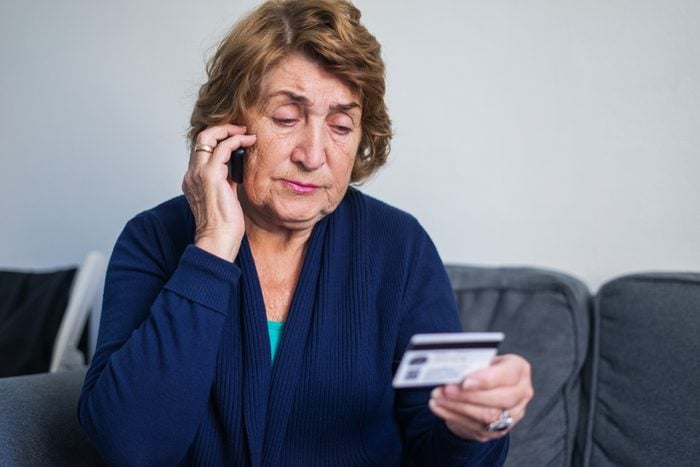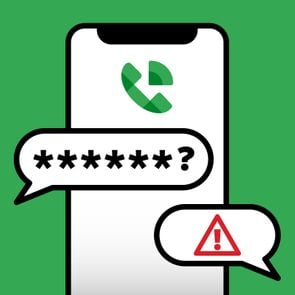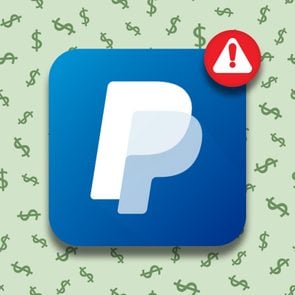How to Protect a Loved One from Elder Fraud
Updated: Oct. 27, 2022

Elder financial abuse is on the rise, but it doesn't have to be a problem for you or a loved one
Of course your kind-hearted granny or elderly neighbor down the street wants to help their loved one who broke their leg while traveling abroad. Only problem is, the chances are high that their loved one is safe at home and that email or phone call requesting help came from a scammer.
This is just one example of elder financial abuse, often referred to as elder fraud, and it’s shockingly common. According to Rebecca Heller, an elder law attorney in New York City, the elderly often fall prey to scams because they’re socially isolated and lonely, someone knows they have money, they’re suffering from some form of dementia or all three.
According to the National Council on Aging, 5 million elderly Americans are scammed each year, and the annual loss totals between $2.9 billion and $36.5 billion. “This impacts seniors’ physical and mental health,” Heller says, “and it’s imperative that their families and community step in.”
All seniors are at risk of falling victim to elder financial abuse, and every one of us is a potential victim of romance scams, bank scams and wire fraud. Educating yourself on these common scams and learning how to identify a scammer are the best prevention.
Get Reader’s Digest’s Read Up newsletter for tips on tech, travel and cleaning, plus humor and fun facts, all week long.
Common examples of elder financial abuse scams
These financial exploitation scams focused on the elderly all work in slightly different ways, yet the outcome is generally consistent: theft of money combined with phishing, the gleaning of sensitive personal information that can lead to identity theft and other more complicated cybercrimes.
“Your grandson broke his leg and is stranded in Thailand”
In this scam, someone calls claiming to be a law enforcement or medical professional reporting an injury in a foreign country, then asks for money for hospital bills. If you receive a call like this or something similar, “get off the phone and call the relative directly to see if the story is true,” says Susan Zaar, senior analyst at Kuma, a global privacy and security consulting company. The scammer may tell you that if you hang up the consequences will be dire, but creating perceived urgency is all part of their nefarious plan.
“This is the IRS and you owe back taxes”
In this scam, someone allegedly from the IRS or Social Security Administration calls saying you owe back taxes or additional fees, but that’s not how these government agencies operate. “Know that these government organizations will never reach out to you via phone,” Zaar says. “If there ever is a real issue, they will mail correspondence on official letterhead.”
“I’m calling on behalf of hurricane Isaac victims”
Humanitarian crises—such as the Ukrainian War or the uptick in natural disasters—bring out the scammers and their fake charities, which Zaar says evade many scam laws. If your donation isn’t tax deductible that’s an immediate red flag, so that should be the first question you ask. Next, ask what percentage of donations received go to the people they claim to help and how much goes to administrative costs.
Note that even if the so-called charity sends you things in the mail, that doesn’t validate their status as a nonprofit. Always check Charity Navigator, which is easy to use and will tell you if a charity is legitimate … or not, suggests Zaar.
“What you did was illegal”
One of Zaar’s relatives bought her medication from Canadian pharmacies to save money. Scammers got her relative’s phone number by hacking the Canadian pharmaceuticals sales list, then called from the “DEA” saying the relative was under investigation for medical fraud, Zaar says. “They even used a real DEA badge number of someone who had worked for that organization, but upon deeper investigation, we discovered that the real DEA agent had passed away.”
“Something’s wrong with your account”
In this version of an elder fraud scam, someone could call or email posing as a representative from your bank, your local utility company or even Amazon. The bank or utilities people may say your account has been compromised or your utilities are going to be shut off if you don’t pay immediately.
In the Amazon version, a “representative” may run through random “charges,” asking the elder if they made them, and of course, they’ll say no. The representative will tell them their password needs to be reset immediately and will offer to walk the victim through it while they screen share. “The objective of the scammer is to obtain banking information, which will allow them to access the victim’s funds through online banking,” says Joshua Rogala, a criminal defense attorney in Winnipeg, Canada, who has experience with elder fraud cases. “Once the scammer has obtained the information, they can access the account and transfer funds.”
“You didn’t read the fine print”
In this example of elder financial abuse, elders may be overcharged because they have trouble reading the fine print, or, if they notice the charges and inquire about them, the perpetrator explains the extra charges in a way that confuses the victim. “I’ve dealt with cases before where an elderly resident at a care home has been overcharged for certain supplies or for their rent,” says Richard Brandenstein, founding partner and attorney at FBR Law. “If the elderly party has no one looking out for them, this type of defrauding often goes unreported or unnoticed.”
Red flags of elder financial abuse
It’s important to know how to recognize the red flags of elder financial abuse. If it happens to someone you love, you’ll want to intervene quickly and mitigate any damage as quickly and thoroughly as possible. Keep an eye out for these signs:
- The elder has a sudden change in spending habits, such as going from being frugal to suddenly withdrawing large amounts of cash.
- The elder is suddenly secretive and refuses to share information when questioned by a trusted loved one. The elder may be being controlled by someone else who may warn them “not to tell anyone about this.”
- The elder is spending all his or her time with a new “friend” and paying for everything they do. The elder is being groomed to turn everything over to the scammer.
- The new “friend” isolates the elder from longtime friends and family members. The scammer needs to keep the elder away from loved ones who may pick up on these red flags.
- The new “friend” is always with the elder, even during doctor and therapy appointments. The con artist is trying to establish credibility and caring.
- After traditionally being responsible with money, the elder is bouncing checks and complains that he or she doesn’t have enough cash. The scammer may be draining the account faster than the elder realizes, perhaps writing checks to himself.
- Valuable items are going missing from the elder’s home. The scammer may be selling them and pocketing the cash.
- The elder cashes out, or wants to cash out, IRAs, pensions and/or stocks. The scammer may be taking all the cash, perhaps telling the elder they have better investment opportunities.
- The elder changes, or wants to change, their will and estate documents. This is the reddest of the red flags; the elder and their family must do everything to get rid of the con artist immediately.
| How to protect yourself from elder financial abuse |
| Remain social. Avoiding isolation is a terrific first step in protecting yourself from elder financial abuse, as loneliness opens people up to being scammed. “Widows and widowers are particularly vulnerable,” says Donna Andersen, founder of Lovefraud.com and author of Senior Sociopaths: How to Recognize and Escape Lifelong Abusers. Senior con artists actively search for suitable targets, combing the obituaries and looking for the recently bereaved, Andersen says. |
| Let them leave a voicemail. You don’t have to politely answer the phone every time it rings. “If you don’t recognize the number, let the call go to voicemail,” Zaar says. “If it’s legitimate, they’ll leave a message, and you can call them back.” It’s not foolproof, but getting on the Do Not Call list cuts down about 50% to 60% of scam calls. |
| Educate yourself. If you want to avoid becoming a victim of financial exploitation, educate yourself on as many scams as possible, including Venmo scams, Cash App scams, Zelle scams and more. Knowing what to do when you receive robocalls and learning what someone can do with just your phone number is a great offense against financial scams. |
| Fill out a Financial Vulnerability Survey. Another way you can protect yourself is by filling out the Financial Vulnerability Survey. The 17-question, self-administered survey helps older adults determine if they’re at increased risk of financial fraud and exploitation and suggests resources to help protect them. |
| Don’t rush financial decisions. Financial planning should be done ahead of time and never as a spontaneous decision. If there’s someone in your life pushing you to make financial decisions—especially big ones like selling real estate or jewelry, cashing out investments or withdrawing large sums of cash—pause and think if this person has something to benefit from your financial decisions. |
| Set up power of attorney. If you get sick, injured or start to show signs of cognitive brain decline, you’ll want to have already established power of attorney. “Appoint a trusted loved one or professional as your financial power of attorney, and if possible, appoint another trusted person to make sure that the holder of the power of attorney is doing their job,” advises Mary Kate D’Souza, co-founder and chief legal officer of Gentreo, a next-generation online estate planning solution that offers a Digital Family Vault, a secure way to digitally store important documents and information with instant access to people of your choosing. |
How to protect a loved one from elder financial abuse
Follow these tips to help guard a loved one from elder fraud.
- Get them on the Do Not Call list. If you’re worried about an elderly relative falling prey to scams, you can get them on the Do Not Call list. This won’t completely eliminate scam calls, but it will reduce them by about half.
- Monitor carefully. The best way to prevent a loved one from elder financial abuse is to have someone as their financial mediator. “Anything that required a keen eye, such as bills, came through me first,” says Brandenstein, who speaks both from a legal perspective and as a son who oversaw his mother’s finances in her later years, “As she was in a home I worried about her being taken advantage of, and there isn’t much for her to spend money on there anyway, so it felt right to take this responsibility away from her.”
- Know what’s available about them online. While an active social media page may tell a con artist that a senior is surrounded by attentive family and friends, it may also give away details of their personal life that help the scammer create an even more believable trap. Phone numbers, addresses, birthdays and names of family members are just the tip of the iceberg. Hobbies, home valuations, friends’ names and favorite businesses can lead to even more targeted scams. The more details a con can include in their pitch, the more likely a senior is to believe that the person is calling from a legitimate company, or is who they say they are.
- Allow technology to help. Online banking makes it easier for your loved one to access and monitor their accounts. If you think the person could use an extra set of eyes when checking their financial statements for inaccuracies and fraud, opt to receive read-only bank statements for each account. Read-only statements are safer than joint accounts and protect the account from extra taxes, overdraft charges and divorce. (If an adult child gets divorced, the joint account can be considered part of that person’s assets.)
- Beware the fox guarding the hen house. “Unfortunately, some of the biggest scams come from trusted family members,” says Elizabeth Loewy, former chief of the elder abuse unit in the Manhattan District Attorney’s Office and current general counsel at EverSafe. “Sometimes children can feel that in exchange for taking care of Mom and Dad, they can also quietly take out a bit of money.” Scams from trusted caregivers, doctors, lawyers, accountants and even friends are also common.
- Look out for bank-statement irregularities. Things to look out for are missing deposits (for example, if your parents’ Social Security deposit usually comes in by the fifth of the month, and one month it doesn’t), out-of-area ATM use, erratic or unusual purchases (say, random charges to QVC or other home shopping networks) and service subscriptions the person doesn’t need, use or want to renew. Other irregularities include unpaid bills and discontinued services such as water and electricity, transferring assets to new “friends,” unexplained disappearances of cash or valuable possessions, and checks written to “cash.”
What to do if you suspect elder financial abuse
- Notify someone at the first sign of trouble. If you notice something suspicious, consult your financial advisor, accountant or family lawyer before it’s too late. The case should eventually find its way to Adult Protective Services, says Loewy. Based on your report, APS will assess the situation and develop a plan for the senior to move forward. Find an APS office near you.
- Report it to the victim’s bank/banking apps. After APS, you should report the fraud to the victim’s bank so they can freeze accounts and perhaps reverse charges or stop payment on checks if it isn’t too late. In some states, you can put a transaction temporarily on hold when there is suspected elder financial abuse. The actions are different depending on how the money was sent, and the Federal Trade Commission (FTC) resource is helpful. The reporting process differs slightly if the scammer was paid through Western Union, wire transfer, gift cards, cryptocurrency or other payment methods.
- Report to the Federal Trade Commission. If the victim sent large sums of money to a scammer, it can be harder to recover, but if it was a large sum ($100,000 or more) you need to report it to the FTC.
- Report it to the National Elder Law Foundation. The National Elder Law Foundation (NELF) is certified by the American Bar Association. NELF helps connect victims of elder financial fraud with attorneys specializing in elder law and needs.
- Report it to the Internet Crime Complaint Center. The Internet Crime Complaint Center (IC3) is where you file complaints for elder financial abuse that originated or existed solely online.
- Report it to your local law enforcement. If the elder financial exploitation crime happened locally, report it to the police in your city and county. Financial abuse includes crimes such as theft, fraud, forgery, embezzlement or money laundering. You can also report financial abuse to your district attorney’s office if you want them to prosecute the person who took advantage of your loved one.
- Use a long-term care ombudsman. A long-term care ombudsman advocates for people living in nursing homes, assisted living communities and similar adult-care communities, and they can assist your loved one in solving the problem. Every state has an Office of the State Long-Term Care Ombudsman.
- Contact the National Elder Fraud Hotline. The National Elder Fraud Hotline is a free resource created by the U.S. Department of Justice (DOJ) for people aged 60 or older to report financial abuse.
Additional reporting by Juliana LaBianca.
Sources:
- Rebecca Heller, elder law attorney with Heller & Associates
- Susan Zaar, senior analyst at Kuma, a global privacy and security consulting company
- Joshua Rogala, criminal defense attorney in Winnipeg, Canada
- Richard Brandenstein, founding partner and attorney at FBR Law
- Donna Andersen, founder of Lovefraud.com and author of Senior Sociopaths: How to Recognize and Escape Lifelong Abusers
- Mary Kate D’Souza, co-founder and chief legal officer of Gentreo
- Elizabeth Loewy, former chief of the elder abuse unit in the Manhattan District Attorney’s Office and current general counsel at EverSafe



